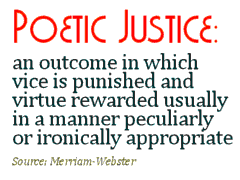As a retiree, I’m no longer engaged in the business world, but I can look back on many years of what I would term to be workplace injustice. Employees penalized for things they didn’t do or couldn’t control, and supervisors rewarded for ideas that weren’t theirs. There were also too many bad decisions that put unqualified people in key positions of power. In the process, I’ve witnessed discrimination, sexual harassment, and favoritism. With all this evil abuse in the office going on without company intervention, all anyone can hope for is poetic justice.
We’ve all envisioned a boss hanging from a noose, beheaded, or tortured. After watching several seasons of King of Thrones, I’ve become accustomed to beheading. Plus, I’m sure there were times when I was pictured dangling from the gallows, while thinking please don’t kill the messenger. Medieval justice of cruel nature is hardly poetic. Whereas, a man who breaks the same arm that he just used to pat himself on the back is maybe a more ironic pay-back. Poetic Justice by definition is “the fact of experiencing a fitting or deserved retribution for one’s actions.” The recent surge in cases of sexual harassment, somehow covered-up through the years, have resulted in long over-due punishment for inappropriate behavior.
In literature, poetic justice is an ideal form of retribution, in which the good characters are rewarded and the bad characters are punished. The better examples are seen in King Lear, Oliver Twist, and Oedipus Rex. In each case, morality triumphs over vice. Virtue deserves a reward, while evil behavior earns punishment. Other popular examples include To Kill a Mockingbird, Cinderella, Romeo & Juliet, MacBeth, and Edgar Allan Poes’s The Tell-Tale Heart, where a man is ironically haunted by the beating heart of the old man he murdered. From my perspective, a quick death like beheading is often not satisfying, while a more drawn-out form of vengeance is far superior. Often times, however, if death is not quick, there’s a greater chance for escape.
I’m anxiously anticipating some poetic justice in Game of Thrones, as Regnant Queen Cersei Lannister continues her evil ways. Her twin brother/lover, Jaime, has already poetically lost his primary sword hand, while her other brother, “The Imp” who “killed” their mother in childbirth, has already murdered their overbearing father. Although a likable dwarf, who has certainly seen his share of bullying and discrimination, he is also due for lightening to strike, perhaps by his own brother. It’s a dysfunctional family at each other’s throats, and Cersei the incestuous, adulteress maintains power through her remaining son, a naive, bastard King born out of her incest. It’s Soap Opera 101, and what I refer to as “Lannister World.” Show Me The Poetry!

Leave a Reply